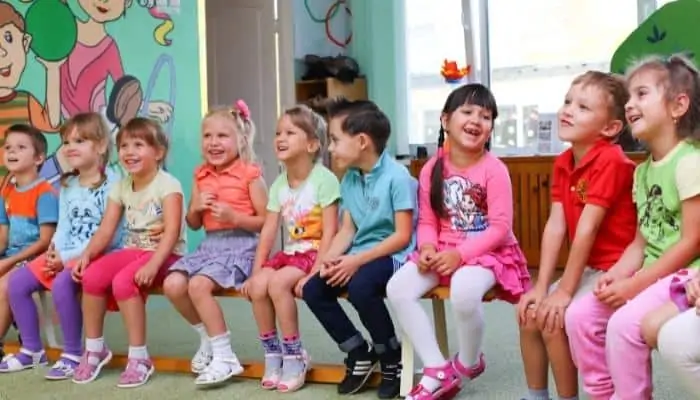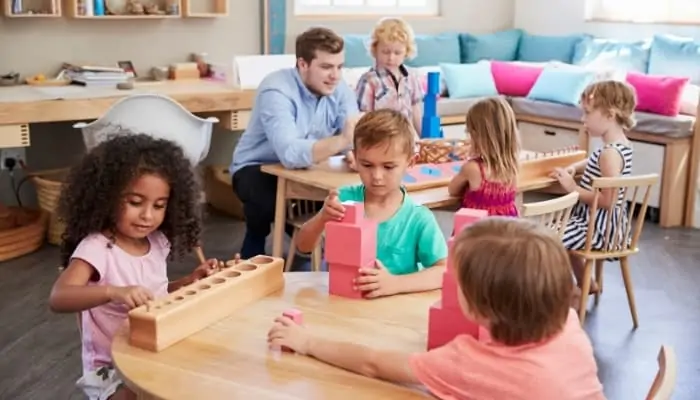Daycare vs Kindergarten: What’s the Difference?

This post may contain affiliate links. If you buy through the link, I may earn a commission. Learn More.
I live in one of the states that doesn’t require kindergarten. For this reason, many people think of kindergarten as surplus and unnecessary.
It’s unfortunate because kindergarten is a valuable experience for young children who need to take that transitory step between daycare and elementary school.
*FYI, some of the links in this article about daycare vs kindergarten may be affiliate links. If you click and make a purchase, we may get a commission (at no extra cost to you). For more info, please see our disclaimer.
What is the Difference Between Daycare and Kindergarten?
Daycare is a place where children are cared for while their parents are away. A daycare doesn’t promise learning opportunities, but it does promise healthy and safe children. Kindergarten is a school-run program that provides early childhood education in a loving environment.
Kindergarten might seem like a glorified daycare, but it isn’t. Kindergarten plants the seeds for learning and social growth.
Children become comfortable with a school setting while still being nurtured by their teacher. It’s a transitional time that is important for young children.
How do Daycare and Kindergarten Differ?

Daycare
Some daycare facilities offer learning opportunities, but many do not. A daycare provides caregiving services, ensures children are adequately fed, and gives them plenty of playtime.
Most daycares operate long hours, from about 7 AM to 6 PM, a time that’s convenient for parents who work full-time.
Kindergarten
Kindergarten puts a focus on learning along with playtime.
Most kindergarten classrooms offer basic education like letters, numbers, shapes, light reading, and plenty of social interaction. Children are given a meal and nap. They’re also offered a lot of playtime.
Kindergarten is less helpful for working parents because, in most places, the school day lasts from about 8 AM to 3 PM. Some half-day kindergartens are even shorter.
Parents who work full-time will need to find childcare for the remainder of the day.
A big difference between daycare and kindergarten is COST. Unless a family chooses to use a private school for kindergarten, the cost is entirely covered by tax dollars.
Daycare is usually about $200 per week. Depending on where you live, your childcare costs could be much higher.
Related: Why is Daycare So Expensive?
Why is Kindergarten Important?

Kindergarten gives children a stepping stone into elementary school. They learn what’s expected of them in the classroom. They’re introduced to kids they’ll spend the next several years of life with. They’re provided with a schedule that helps them understand how to navigate school going forward.
One of the most important parts of kindergarten is the new independence gained by children.
They’re suddenly much more responsible for their own meals, playtime activities, and even getting off and on the school bus by themselves.
This newfound independence is vital to the development of young minds.
Who Might Choose to Skip Kindergarten?
Many states do not require kindergarten. Some don’t even require school districts to offer kindergarten. People who live in those states may opt-out if they believe their children aren’t ready.
A child who’s late to mature or who has some health issues might benefit from another year under nurturing, one-on-one care that isn’t offered by kindergarten teachers.
A different option might be to attend a private kindergarten that mimics what is offered in a public school while also being in an environment specializing in providing more individual care.
Key Takeaways (Chart Included)
Kindergarten and daycare offer very different services. Most children need kindergarten to prepare them for the rigorous days of elementary school.
What do you think? Will you send your child to a standard kindergarten or make a different choice? Tell us in the comments!
| Daycare | Kindergarten |
|---|---|
| For children from birth through age 6+. | For children ages 5-6. |
| Daycare centers cost about $200 per week on average. | There’s no fee for public kindergarten programs. |
| Usually operates full-time, including most school holidays and summers. | Usually runs from about 8 AM to 3 PM. A kindergarten program is usually closed during school holidays and summers. |
| Daycare programs focus on child care with no guarantee of education. | The focus is on early childhood education. |
| No transportation is offered. | Bus services are offered before and after school. |
| Staff experience can be limited. | Teachers must have four-year degrees and teacher certification. |
